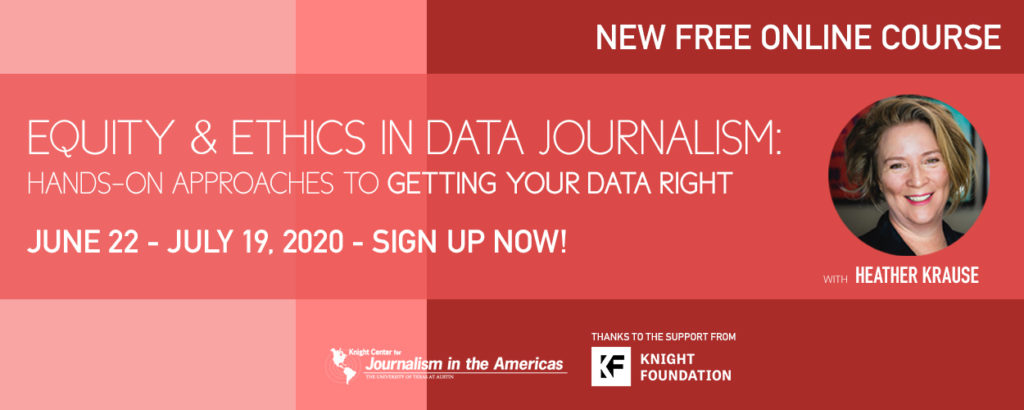
Incorporating data into journalistic projects is a popular and effective way to engage audiences and convey large sets of information. However, if journalists are not careful, it can also mean including inequity and hidden bias into your storytelling.
That’s why the Knight Center, with support from the Knight Foundation, is offering the Massive Open Online Course (MOOC), “Equity and Ethics in Data Journalism: Hands-on Approaches to Getting Your Data Right,” taught by data expert Heather Krause. The four-week course runs from June 22 to July 19, 2020, so register today!
“Equity and ethics in data journalism is related to being aware and transparent about the embedded sources of bias, power, and values in both the data and the story the data is telling,” Krause explained.

The course is divided into four weekly modules:
“While data journalism is often viewed as a way to use something that’s fairly objective, such as quantitative data, as a primary source for a story – it is very, very easy to accidentally use data in very biased or unfair or incorrect ways,” Krause said. “Many of these accidental mistakes come from believing that ‘data is objective,’ that ‘math doesn’t lie’ and that using data as a source is less biased than using more traditional sources in journalism. Very few tools exist that can be practically applied to help journalists check their work for hidden sources of bias, racism, sexism, etc. Without these, data journalism tends to have hidden equity and ethics problems.”
“The Knight Center’s distance learning program, created in 2003, has been a pioneer in online courses about data journalism. Our first MOOC in 2012 was ‘Introduction to Data Visualization,’ with Alberto Cairo and we had many MOOCs about the same topic. Now, we are delighted to have this all-new course focusing on equity and ethics in data journalism,” said professor Rosental Alves, founder and director of the Knight Center. “It’s a privilege to count on Heather Krause to teach this free online course on the topic that has become her passion.”
The course is open to anyone interested in data and equity, and does not require any advanced skills or tools.
Heather Krause is a data scientist and storyteller who focuses on implementing tools for equity and ethics in data. She is the founder of Datassist and We All Count, a project for equity in data, working with teams across the globe to embed a lens of ethics into their data products from funding to data collection to statistical analysis and algorithmic accountability. She is also chief data scientist at Orb Media and is on the Data Advisory Board of the UN High Commissioner for Refugees.
This is the third course Krause has taught for the Knight Center’s distance learning program. The first was 2017’s “Data Exploration and Storytelling: Finding Stories in Data with Exploratory Analysis and Visualization” with Alberto Cairo, which attracted nearly 7,000 students. The second was a Big Online Course (BOC), also in 2017, “Crafting Data Stories: A hands-on, step by step workshop building real data narratives.”
This latest course consists of video lectures, readings and handouts or exercises, quizzes and participation in discussion forums.
Students who successfully complete course requirements have the option of paying an administrative fee of U.S. $30 to receive a certificate of completion in PDF format. The Knight Center will evaluate the cases of students who need a waiver of that fee. No formal college credit is associated with the certificate.
Like all Knight Center MOOCs, the course is asynchronous, meaning participants can take it during the days and times that best suit them. However, there are recommended weekly deadlines to complete activities so as not to fall behind.
Register for this free course today to avoid the pitfall of including bias and inequity in your data journalism.
About the John S. and James L. Knight Foundation
The Knight Foundation is a national foundation with strong local roots that invests in journalism, the arts and in the success of cities where brothers John S. and James L. Knight once published newspapers. Its goal is to foster informed and engaged communities, which it believes are essential for a healthy democracy. For more, visit kf.org.
About the Knight Center
The Knight Center for Journalism in the Americas was created in 2002 by Professor Rosental Alves, Knight Chair of Journalism at the Moody College of Communication at the University of Texas, thanks to the generous donations of the John S. and James L. Knight Foundation. The Knight Center’s distance learning program began in 2003 and is funded in part by the Knight Foundation. Over the past six years, the Knight Center MOOCs have reached more than 210,000 people in 200 countries and territories.